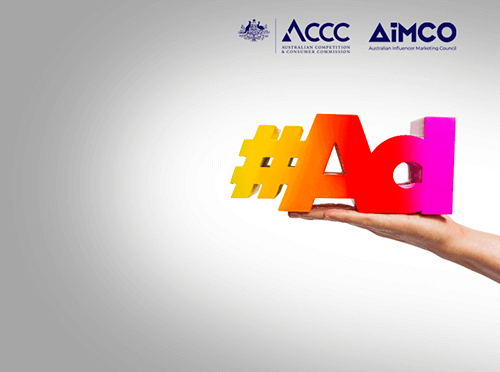Highlights from the ACCC Influencer Sweep Findings
ACCC has revealed the key issues for consumers and businesses, and potential harms emanating from the provision of social media services in Australia.
The sixth interim report for the Digital Platform Services Inquiry, was published Friday and highlights potential competition and Consumer Law issues affecting both consumers and advertisers.
The issues identified by the ACCC’s analysis of social media services include:
- the significant market power of Meta
- data collection and use practices
- a lack of effective dispute resolution mechanisms for consumer and business users
- harm to Australians caused by scams
- a lack of advertising transparency
- inadequate disclosures by influencers.
Responsible advertising is key to a healthy self-regulatory system and AANA continues to engage with government, regulators and the industry to ensure compliance with the Code of Ethics which requires influencer marketing be disclosed in a way that is upfront, clear and obvious.
Watch AANA webinar with the ACCC on the Influencer Sweep findings
In a webinar in April, the ACCC gave AANA members a preview of its preliminary findings and concerns arising from their influencer sweep which took place from 23 Jan to 3 Feb this year.
So, following the webinar and the issues of concern to the ACCC, what additional steps should advertisers take to avoid coming into the ACCC’s crosshairs?
- The ACCC is focussed on influencers of all sizes but, if you are using micro-influencers with a small loyal following, be aware that consumers may not be aware that they are engaged in marketing so their disclosure needs to be especially clear, upfront and obvious.
- Ensure any agreements with influencers require the disclosure to be upfront in the post or video, not hidden in amongst the post.
- Likewise, if gifting products to influencers, ensure the disclosure of the gift is upfront and obvious. For example, if the gift is a free ticket to an event, the post could be a photo of the influencer standing in front of a large sign with the brand’s logo on it and thanking the brand up front for the ticket to the event. Likewise, if sending food to influencers to be reviewed, the influencer could mention at the start of the video that X brand has sent them the product to try.
- If you have an agreement with an influencer for a specific number of posts, make it clear that they should not do extra posts. But if they do, those extra posts need to be disclosed as if they were paid posts. Adding #notanad or #notspon on such posts is potentially misleading and should be avoided.
- The ACCC expects brands to be in control of any posts made by influencers however if a brand has a clear agreement which requires clear, upfront disclosure and the brand takes steps to rectify any non-disclosure, this will be a mitigating factor in any investigation.
If you have any queries, you can reach out to Megan McEwin or Marit Anderson for free advice on the AANA Codes as part of your AANA membership.




